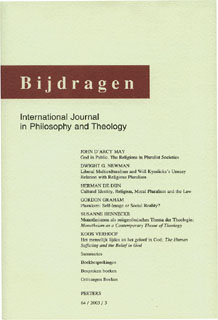 previous article in this issue previous article in this issue | next article in this issue  |

|
Document Details : Title: Bauer contra Strauss Subtitle: De jonghegeliaanse strijd om de historische waarde van het evangelie Author(s): DE VRIESE, Herbert Journal: Bijdragen Volume: 73 Issue: 4 Date: 2012 Pages: 416-446 DOI: 10.2143/BIJ.73.4.2959715 Abstract : The gospel critique of David Friedrich Strauss and Bruno Bauer occupies a central position in Young Hegelianism. It constitutes the solid, exegetical rock on the basis of which the Young Hegelians develop their radical critique of religion. This critical achievement – let us only add the names of Feuerbach and Stirner – stands as one of the most original and influential developments on the domain of critique of religion in the entire history of western philosophy. Yet, the historiography of the Young Hegelian movement is flawed by a serious, but widespread misunderstanding about the relation between the Gospel critiques of Strauss and Bauer. More often than not, it is suggested that Strauss and Bauer differ only in the details, not in the general principles: essentially, the research strategy to reduce the Gospel history to either ‘myth’ or ‘literary fiction’, would boil down to the same position, because in either case the historical veracity of the life of Jesus is deeply suspect. Such an interpretation, however, is completely untenable. This article intends to clearly summarize and compare the basic principles and findings of both critical works, in order to show that the way Bauer’s Kritik der evangelischen Geschichte relates to Strauss’ Das Leben Jesu is not simply one of adaption, but rather one of radical negation: while the latter gives a critical account of the historical Jesus, only the former shows this to be an uncritical assumption. This basic research result holds the key to a valuable contribution to philosophical literature on Young Hegelianism, since any interpretation of its critique of religion, without a more reliable account of the relation between the Gospel critiques of Strauss and Bauer, is bound to remain incomplete or even misleading. |
